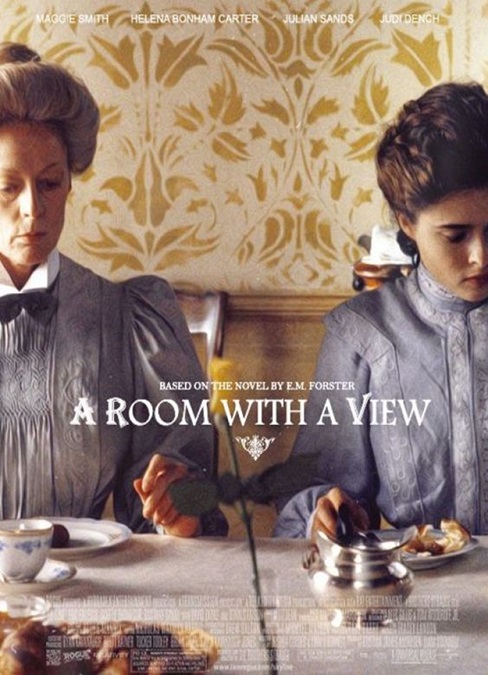
A Room With a View – 1986
This was a movie about stuffy British people being stuffy and British. Sorry, but that needed to be said. It starred Helena Bonham Carter, Julian Sands, Maggie Smith, Simon Callow, Judi Dench, Denholm Elliott, and Daniel Day Lewis. A pretty impressive cast of actors, to be sure, and they each did a fine job. But it was the dull script that made the movie so slow and stuffy.
In order to explain the film’s title, I’ll describe the first few minutes of the movie. Smith plays the character of Charlotte Bartlett, an uptight old spinster who is acting as chaperone to her much younger friend, Lucy Honeychurch, played by Carter. The beautiful young girl has been brought up in an upper-middle-class family but is much more relaxed in her way of thinking. The two are traveling in Italy on holiday. Charlotte complains that the room they rented was supposed to have a view, but does not. As they go to dine, she complains out loud, and is overheard by Mr. Emerson, played by Elliott, and his brooding young son George, played by Sands. The two gentlemen offer their room, which has a view, to the ladies. Forbidden romance blossoms between Lucy and George.
The holiday ends and Lucy returns home to Surry in England. Upon their return, Lucy becomes engaged to Cecil Vyse, played by Sands. He is a jerk who treats Lucy as a valuable object that he will soon be able to display on his arm. Mr. Emerson and his son rent a home in Surry and George tries to re-kindle his romance with Lucy. She does her best to refuse him, but eventually realizes that she does not love Cecil. Against all propriety and sense, she realizes that she loves George and the two end up together. The end.
The plot was fairly predictable and moved too slowly for my tastes. I never had any question who Lucy would choose to be with in the end. There was never any real tension or suspense. The best and most interesting aspect of the film was the sets and costumes. It was a period piece, and British films have never been wanting in that regard. Lucy’s dresses were beautiful, but not too fancy. The stuffy old ladies dressed like stuffy old ladies. The men dressed properly in their old-fashioned suits. They all looked perfectly appropriate whether they were in their costumes or completely naked.
What??? Yes, completely naked. There is a scene that was incredibly gratuitous and random in its use of full frontal male nudity. At one point, just after George arrives in Surry, he, Lucy’s younger brother Freddy, played by Rupert Graves, and the local Reverend, Mr. Beebe, played by Callow, decide to frolic naked around a pond out in the woods. They all strip off, and proceed to run around the pond, splash in the water, and hoot and holler like children. I still can’t figure out what the strangely homo-erotic scene had to do with the rest of the plot. Of course, the ladies happen to walk by and see the naked reverend, and are scandalized!
But in typical, stuffy, British fashion, there was no power behind the story’s romance or its drama. Sure, you could say that it was a portrait into a different time in history, a look into the sexually restrictive nature of the upper-middle class of the Edwardian era. But really, the biggest message that I got out of that is a truth that can be said of any era and any culture: Young people are more open minded about sex than old people. I know, I’m over-simplifying the movie’s message, but its kind-of true.
The film looked visually beautiful, despite its lackluster story. But it wasn’t a bad story. It was, for me, just a little dull. And as I think about it, changing the character of Cecil would have made all the difference. Cecil is never shown in a good light. Right from the first moment he is on the screen, I could tell that he was a stuffy man who had no passion for youth, no love for Lucy, and no real likeable qualities. Therefore, the question as to whether Lucy would end up marrying him was effectively pointless. But if Cecil had been a good man, or if I had ever thought she had any reason to stay with him, then I could have taken a greater interest in what she might do, which way she might turn. Or maybe if Cecil had been such a bad man that he found some kind of way to force Lucy to marry him, despite her love for George, it might have made for a more dramatic, or even tragic ending. But no. What we got was predictable and bland.








